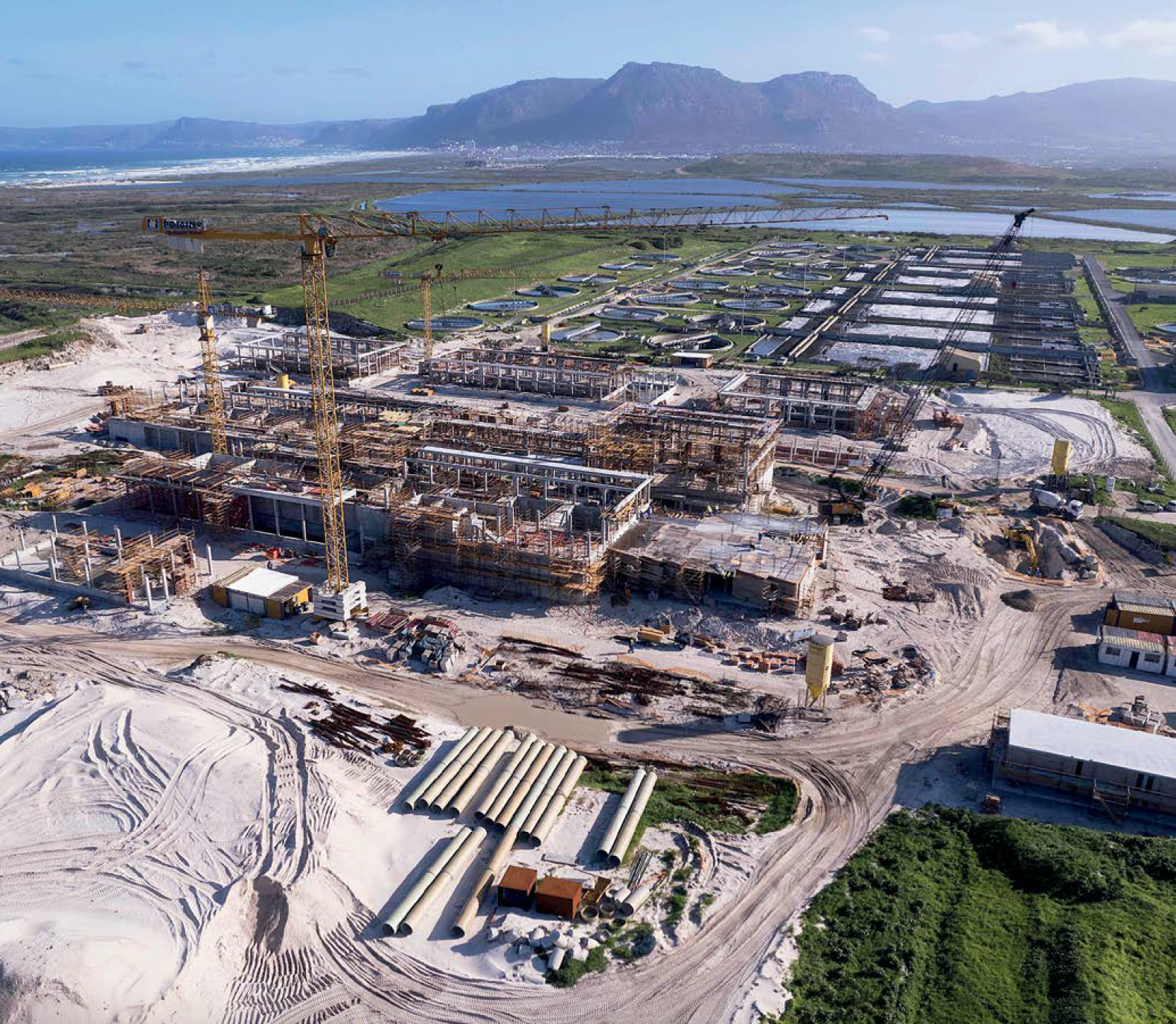
South Africa’s Cape Town Details Bulk Infrastructure Plans
[ad_1]
The City of Cape Town government in South Africa presented its latest Infrastructure Report during the Sustainable Infrastructure Development Symposium held in the city on 17-19 March. The event focused on South Africa brought together key stakeholders from across the continent with the aim of driving infrastructure development.
The City of Cape Town Infrastructure Report dated December 2023 provides an update on the bulk infrastructure project pipeline assessed in the 2022 inaugural report, outlining a Rand 120 billion (US$6.3 billion) project portfolio up to 2031.
The report coincides with the announcement of a Rand 20 billion (US$1.1 billion) expansion plan by the developer of Cape Town’s Victoria & Albert Waterfront to be executed in phases over the next 15-20 years.
The Infrastructure Report is intended to provide a transparent evaluation of the City of Cape Town’s infrastructure plans in five bulk infrastructure sectors, namely energy, urban mobility, human settlements, water and sanitation, and urban waste management.
Energy
GenerationIn the energy sector, the majority of capital expenditure is committed to the expansion and development of assets. Projects include energy-efficiency measures to support energy security.
Energy generation projects in Cape Town Source: City of Cape Town Infrastructure Report, 2023Several new generation projects are also planned, with the aim of protecting the population from load-shedding.
New energy generation projects in Cape Town Source: City of Cape Town Infrastructure Report, 2023DistributionSeveral projects are also planned to expand distribution networks. The report notes that the continued theft and vandalism of infrastructure poses a significant challenge.
Energy distribution projects in Cape TownSource: City of Cape Town Infrastructure Report, 2023Urban mobility
The Urban Mobility Sector Plan is currently under comprehensive review, in parallel to the review of the City’s Integrated Public Transport Network (IPTN) plan, which is targeted for completion by 2025.
The Khayelitsha–Century City, Symphony Way and Klipfontein corridors are the next planned major public transport corridor projects, after the completion of MyCiTi Phase 2A (Claremont/Wynberg to Khayelitsha/Mitchells Plain). These new schemes have a total estimated value of Rand 21 billion (US$1.1 billion), on top of the Rand 26 billion (US$1.4 billion) already in the portfolio.
At this stage, the schemes have been captured as bus rapid transport (BRT) corridors, although the modality has yet to be determined and may change subject to the expected demand, which is currently being defined and assessed. Speed of movement for high-occupancy public transport will be the priority.
Urban mobility programmes in Cape Town Source: City of Cape Town Infrastructure Report, 2023The Public Transport (PT) Priority Measures Programme is a collection of 20 projects across Cape Town that will provide priority interventions along the city’s road network to improve public transport speeds through dedicated lanes, intersection optimisation and grade separation for public transport modes.
The PT Priority Measures Programme will be supported by the PT Stop and Shelter Programme, which will invest in embayments, bus shelters, signage and other infrastructure interventions to improve the overall quality, safety and experience of public transport passengers across various public transport modes.
In addition, the city will invest in expanding the Transport Management Centre (TMC) through phases 2b and 3 to manage, operate and optimise a continually growing transport network citywide.
RoadsThe Congestion Relief Programme is a response to the city government’s commitment to reducing the time residents spend in traffic every day through targeted road capacity improvements and interventions.
There are 14 major projects in the pipeline, six of which relate to new infrastructure builds, while the remaining eight are expansions of existing infrastructure. The programme also consists of 23 minor projects (14 expansion projects and nine new projects) resulting in a total Rand 5.8 billion (US$306.7 million) capital commitment over the 10-year portfolio (2022-31).
Road congestion relief projects in Cape Town Source: City of Cape Town Infrastructure Report, 2023The expansion of Berkley Road entails dualling the road, together with the provision of cycle lanes, public transport stops, sidewalks and upgrades and signalisation to the M5 interchange. This scheme is set to alleviate congestion by improving both link and intersection capacity.
The extension of Berkley Road from the M5 to Liesbeek Parkway will complete an important missing link in the road network that will alleviate congestion while also supporting the redevelopment of the Two Rivers Urban Park. The city-driven dualling of Berkley Road is in the detail design phase and is expected to be completed in 2027.
The Voortrekker Road expansion project comprises the widening of Koeberg Road between Voortrekker Road and Royal Road, as well as the dualling of Voortrekker Road between Station Road in Maitland and 12th Avenue in Kensington. This is targeted for completion in the 2026/27 financial year.
In addition, a scheme is under way to extend Prestige Drive, which runs from Voortrekker Road northwards to the N1, creating a new N1/Prestige Drive interchange. This project is in the scoping phase and implementation is anticipated for 2038.
A new MyCiTi station is planned in Maitland as part of MyCiTi phase 1. The project is in the detailed design phase and construction is set to commence in July 2024, with the station becoming operational by mid-2026.
Meanwhile, the Metro Roads Reconstruction Programme involves the identification of the overall maintenance and rehabilitation needs for the road network and has two major schemes: the Jakes Gerwel project is expected to be completed by 2025 and the completion of the Simon’s Town main road rehabilitation has been postponed to 2028.
Metro roads reconstruction projects in Cape Town Source: City of Cape Town Infrastructure Report, 2023Water and sanitation
Water and sanitation spending makes up 42% of Cape Town’s 10-year project pipeline. This is largely driven by increased pipe replacement and pumping station-related investments aimed at reducing sewer spills.
Bulk waterDue to budget constraints and the need to keep tariffs affordable, the city is prioritising wastewater over bulk water to address wastewater treatment backlogs. The government is currently reviewing demand and reprioritising projects within the portfolio to address areas of greatest need and highest demand first while postponing others.
Bulk water projects in Cape Town Source: City of Cape Town Infrastructure Report, 2023DesalinationDue to the complexity and financial commitments required for executing desalination projects, the city has begun talks with the National Treasury around the establishment of a public-private partnership (PPP). Meanwhile, phase 1 of the city’s first desalination plant (70 million litres a day) remains on track to be completed in 2030.
Bulk water projects in Cape Town Source: City of Cape Town Infrastructure Report, 2023ReservoirsA number of reservoirs are included in the capital project pipeline, some of which respond to existing capacity constraints and some of which will provide storage capacity for new water produced through either the Bulk Water Augmentation Scheme (BWAS) or the New Water Programme.
The Steenbras Reservoir’s infrastructure is currently undergoing a re-evaluation process under the 2022-24 masterplan, which has prompted further infrastructure interventions that are presently being assessed for both the Helderberg scheme and the Steenbras Reservoir.
Additional bulk water projects in Cape Town Source: City of Cape Town Infrastructure Report, 2023Meanwhile, following a feasibility study, a decision has been made to construct a 20-million-litre reservoir close to the Brakkloof Reservoir to address the single distribution pipeline risk. The project is now expected to enter the design stage.
Wastewater treatmentFor wastewater treatment works (WWTW), phase 2 of the Zandvliet facility is scheduled to start in the 2027/28 financial year and end by 2034/35 – this is a postponement on the original timeline due to budget constraints. The 20-million-litres-a-day first phase will be completed in early 2024. The Potsdam WWTW is currently on track for commissioning by the end of the 2026 financial year.
WWTW projects in Cape Town Source: City of Cape Town Infrastructure Report, 2023SludgeOn wastewater sludge treatment, phase 1 of the southern sludge facility/biosolids beneficiation facility (BBF) project is currently scheduled for commissioning in the 2028/29 financial year and phase 2 is set for commissioning in 2030/31. The city is also investigating the feasibility of using PPPs for sludge projects in the future.
Sludge projects in Cape Town Source: City of Cape Town Infrastructure Report, 2023Sewer pump stationsThe city has identified 20 pump stations that will be upgraded in the future. The eight listed below are included on the major projects list with a dedicated budget.
Sewer pump station projects in Cape Town Source: City of Cape Town Infrastructure Report, 2023StormwaterThe city is prioritising the implementation of projects to address known backlogs in the stormwater system.
Stormwater projects in Cape Town Source: City of Cape Town Infrastructure Report, 2023The Diep River catchment currently has two priority schemes, namely Doornbach, which aims to divert greywater within the stormwater system to the sewer system at the Potsdam WWTW, and Theo Marais Canal, which looks to improve the water quality of Milnerton Lagoon.
The Lourens River flood alleviation project entails the design and construction of a bypass channel around the Somerset West central business district (CBD), while the Macassar flood alleviation scheme will upgrade the Macassar River corridor and alleviate seasonal flooding in the areas of Kramat, Zandvlei and Macassar.
The Vygekraal project will cover the repair and stabilisation of the riverbanks of the Vygekraal River between Vanguard Drive and Statis Heights, while also creating a river corridor through Nantes Park.
The Diep River Erica Road outfall scheme aims to improve water quality in the Diep River and Milnerton Lagoon.
The Geelsloot project has several sub-projects that will occur over several years, with an estimated completion date of December 2027.
The Sir Lowry’s Pass River upgrade will secure the safe conveyance of water through the Firlands agricultural area. It will also ensure the safe conveyance of water in the existing development areas in Gordon’s Bay.
The Soet River upgrade project will cover the upgrading of the existing stormwater drainage channels, a detention pond, and pipe upgrade to mitigate flooding and reduce pollution.
Human settlements
Housing supply does not meet current demand levels in Cape Town. The below table provides an update on progress made through the land release for the affordable housing mayoral priority programme (MPP) in the last year.
Land release MPP in Cape Town Source: City of Cape Town Infrastructure Report, 2023Schemes in the pipeline for the medium term include informal settlement and backyarder upgrades or infills, and hostel and council housing rehabilitation and refurbishment projects entailing plumbing and electrical upgrades, window replacements and so on.
The report notes there has been a policy shift by the National Department of Human Settlements regarding the current grant funding model. The national government will no longer be funding breaking new ground (BNG) housing and will instead channel grant funding allocations towards the upgrading of informal settlements. The report states this shift is expected to make it difficult to develop housing at greater densities.
Waste management
The city operates two landfill sites: Coastal Park and Vissershok. Coastal Park has four years of remaining capacity after which all waste will have to be transported to Vissershok, which will be under increased pressure. Projects are planned to address these constraints.
Land acquisition for a new regional landfill site has been delayed and the directorate has had to initiate a new process, currently in the feasibility stage, for the identification of a new site for development. This project has been marked as a critical priority for the city.
Landfill projects in Cape TownSource: City of Cape Town Infrastructure Report, 2023The city’s transfer stations will undergo upgrades and two new stations will be developed at Coastal Park and in the Helderberg district to increase overall capacity.
Refuse drop-off projects in Cape Town Source: City of Cape Town Infrastructure Report, 2023Refuse transfer station projects in Cape TownSource: City of Cape Town Infrastructure Report, 2023Top photo: Cape Town construction works (Source: City of Cape Town Infrastructure Report, 2023)
[ad_2]
Source link




